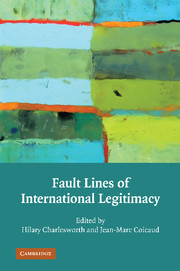Book contents
- Frontmatter
- Contents
- Acknowledgments
- Contributors
- Introduction
- PART I FROM THE HISTORY AND STRUCTURE OF INTERNATIONAL LEGITIMACY TO FAULT LINES IN CONTEMPORARY INTERNATIONAL POLITICS
- PART II THE UN SECURITY COUNCIL: EXPRESSION, VENUE, AND PROMOTER OF INTERNATIONAL LEGITIMACY?
- 6 Legal Deliberation and Argumentation in International Decision Making
- 7 The UN Security Council, Regional Arrangements, and Peacekeeping Operations
- 8 The Security Council's Alliance of Gender Legitimacy: The Symbolic Capital of Resolution 1325
- PART III LEGITIMACY OF INTERNATIONAL INTERVENTIONS AND HIERARCHY OF INTERNATIONAL RIGHTS
- PART IV IN SEARCH OF NEW FORMS OF INTERNATIONAL LEGITIMACY: BETWEEN POWER AND PRINCIPLES
- Conclusion: The Legitimacies of International Law
- Index
- References
6 - Legal Deliberation and Argumentation in International Decision Making
Published online by Cambridge University Press: 06 April 2010
- Frontmatter
- Contents
- Acknowledgments
- Contributors
- Introduction
- PART I FROM THE HISTORY AND STRUCTURE OF INTERNATIONAL LEGITIMACY TO FAULT LINES IN CONTEMPORARY INTERNATIONAL POLITICS
- PART II THE UN SECURITY COUNCIL: EXPRESSION, VENUE, AND PROMOTER OF INTERNATIONAL LEGITIMACY?
- 6 Legal Deliberation and Argumentation in International Decision Making
- 7 The UN Security Council, Regional Arrangements, and Peacekeeping Operations
- 8 The Security Council's Alliance of Gender Legitimacy: The Symbolic Capital of Resolution 1325
- PART III LEGITIMACY OF INTERNATIONAL INTERVENTIONS AND HIERARCHY OF INTERNATIONAL RIGHTS
- PART IV IN SEARCH OF NEW FORMS OF INTERNATIONAL LEGITIMACY: BETWEEN POWER AND PRINCIPLES
- Conclusion: The Legitimacies of International Law
- Index
- References
Summary
Questions about the legitimacy of international decision making have arisen in proportion to the growing autonomy of international organizations. If these organizations are able to wield influence not directly traceable to the consent of member governments, what is the source of their legitimacy? In the context of the European Union (EU), the concern is typically framed in terms of the democratic deficit, characterized by the increasing remoteness of those who make decisions from those who are affected by them. Proposals on how to bring down that deficit bump up against a larger question: Can democracy be transposed beyond the level of the nation-state? This chapter explores that question by drawing on the theory of deliberative democracy. My central claim is that voting arrangements are not the only gauge of legitimacy in international organizations; one must also look at the quality of deliberations that precede and follow decisions taken. I support that claim first by identifying a core principle of the theory of deliberative democracy: any decision must be backed by good arguments. What counts as a “good argument” varies from setting to setting, depending on the normative framework within which the deliberation occurs. I then consider whether, as a matter of theory, there are grounds for applying the deliberative principle at the transnational level. I argue that particular conventions of argument and discourse operate in any deliberative enterprise, the parameters of which are set by an interpretive community associated with the enterprise.
- Type
- Chapter
- Information
- Fault Lines of International Legitimacy , pp. 175 - 203Publisher: Cambridge University PressPrint publication year: 2010



